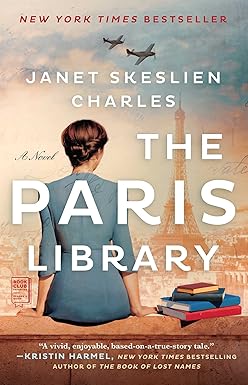Genres: Fiction, Historical

Janet Skeslien Charles's The Paris Library is a beautifully woven narrative that seamlessly intertwines the harrowing experiences of World War II with the bittersweet realities of contemporary life. With its dual timelines and richly developed characters, the novel offers a moving exploration of love, loss, and the enduring power of books.
The story is set against two distinct backdrops: Paris during World War II and Montana in the early 1980s. In 1939, Odile Souchet, a young and idealistic librarian at the American Library in Paris, appears to have a charmed life. Her job at the library and her relationship with a police officer seem to promise a bright future. However, as the Nazis occupy Paris, Odile’s life is thrown into turmoil. Along with her fellow librarians, she becomes a covert member of the Resistance, using the library as a base to fight back against the invaders. This part of the novel is both thrilling and poignant, capturing the courage and sacrifice of those who fought for freedom through the written word.
The narrative then shifts to 1983 Montana, where Lily, a lonely teenager with dreams of adventure, becomes intrigued by her reclusive elderly neighbor, who turns out to have a mysterious past. As Lily delves into her neighbor’s history, she uncovers connections that reveal a shared love for language and uncover a hidden, profound link between their lives.
Skeslien Charles masterfully contrasts the historical and contemporary narratives, using each timeline to enrich the other. Odile’s story is one of bravery and betrayal, filled with the tension and drama of wartime Paris. The reader is drawn into her world through vivid descriptions and a deep emotional resonance that highlights the impact of her wartime decisions and personal sacrifices.
Lily’s storyline, while quieter, offers a reflective counterpoint to Odile’s tumultuous experiences. Through Lily’s eyes, the reader discovers the long-lasting effects of past traumas and the way they ripple through generations. The connection between Lily and her elderly neighbor adds a layer of mystery and depth, gradually revealing the profound impact of historical events on individual lives.
The thematic exploration of books as a form of resistance and solace is central to the novel. The American Library in Paris symbolizes hope and resilience, while the books within its walls serve as both a literal and metaphorical weapon against oppression. Skeslien Charles’s portrayal of the library as a beacon of knowledge and courage reinforces the idea that literature can be a powerful force for change.
Skeslien Charles’s prose is both evocative and accessible, drawing readers into the richly detailed worlds of both Paris and Montana. The characters are well-developed, with their personal struggles and triumphs adding depth to the narrative. The emotional arcs of both Odile and Lily are compelling, providing a satisfying blend of historical intrigue and personal discovery.
In conclusion, The Paris Library is a compelling and poignant novel that deftly intertwines two narratives to explore themes of courage, betrayal, and the unifying power of literature. Janet Skeslien Charles has crafted a story that not only honors the bravery of those who lived through wartime but also reflects on the enduring connections that bind us across time and place. This novel is a must-read for anyone who cherishes the transformative power of books and the resilience of the human spirit.

